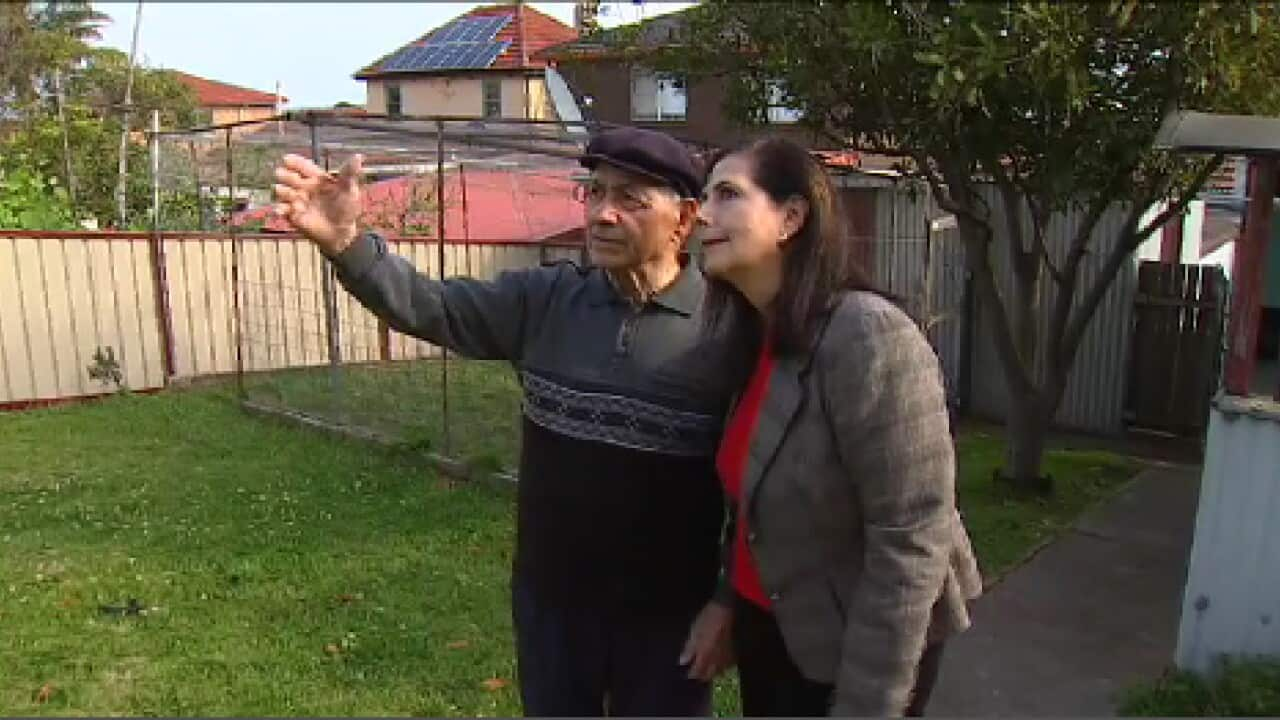(Script from SBS World News Radio)
It's a disease that can cause greater suffering to those who don't have it - and it's on the rise, with a new case every six minutes.
Dementia is a mental illness which robs people of memories and acquired skills, including frequently speech.
The impact this has on culturally diverse communities is exemplified by the challenges facing Senator Concetta Fierravanti-Wells who's shared her family's story with SBS to mark Dementia Awareness Month.
Karen Ashford reports.
(Click on the audio tab above to hear the full report)
It's a classic migrant story - arriving from Italy in the 1950s, marriage and children, slogging at the local steelworks - the Fierravanti home in Port Kembla, south of Sydney, holds a lifetime of memories.
But now, Mr Fierravanti has been forced to leave behind his home, as dementia erases those memories.
His daughter Senator Concetta Fierravanti-Wells says the decline began three years ago.
"The first thing we noticed is he was starting to forget things. He wasn't reading as much. The house is on a heavily trafficked road and it became difficult because he used to go down the street and buy the bread and all that sort of stuff, but he just couldn't do that any more. We were very concerned about him wandering, sometimes even at night."
As the former steelworker's condition worsened, his wife and daughter were faced with the heart wrenching decision to place him in professional care - the very antithesis of close knit Italian family tradition.
Senator Fierravanti-Wells says the separation of lifelong soul mates has taken a toll on her mother.
" My parents have known each other since they were at school together, so 80 years. It's very hard to know somebody for 80 years, to be married to somebody for a such a long time and to virtually see them disappear- It's hard for dad, but I think it's actually been harder for my mum."
One of the biggest casualties of the disease is the ability to speak.
Much to his daughter's frustration, dementia is robbing Mr Fierravanti of his speech.
"Father's always been a very jovial, joking sort of person, very intelligent. It's really hard to see the person that he is today. But every so often there's still those flashes."
The Fierravantis are not alone - growing ranks of ageing migrants are presenting challenges to the health system as language fades.
Deborah Burton is from Uniting Care Wesley's Regency Green Multicultural Aged Care facility in Adelaide.
She says language loss is one of the most difficult aspects of dementia, as she recounts the tale of one resident.
"She had four languages but unfortunately as her dementia progressed she made sense in none of the languages and our staff found it very distressing that they could not communicate with her and help her with her needs."
Alzheimer's disease is perhaps the best known of some 300 types of dementia.
Alzheimer's Australia President Graeme Samuel says the toll is significant, and growing.
"We have in Australia 330,000 or more people who have been diagnosed with dementia. It's estimated that there's an extra 1,700 people being diagnosed each week and that has an enormous drain on community resources."
One of the challenges is to reduce negative perceptions that surround mental illness.
Mr Samuel says Alzheimer's Australia has named September "dementia month" in a bid to raise awareness about the disease, including in migrant and refugee communities.
"We want to remove the stigma associated with dementia, which is after all just another disease. But we also want to create more dementia-friendly communities, that is where those who are living with dementia are removed from that process of isolation that tends to occur when it becomes evident they are living with dementia."
The Chief Executive Officer of Multicultural Aged Care Incorporated Rosa Colanero says transforming community attitudes is no small task.
"As a disease it's a fairly modern one and many of the cultural groups don't have a word for dementia, and so there is quite a bit of cultural awareness that needs to be done, about the concept of dementia, what it means and how to cope with it."
It's estimated 1.2 million people are involved in caring for those with dementia, but its rapid growth means Australia faces a shortage of more than 150,000 paid and unpaid carers within 15 years.
Deborah Burton says almost a quarter of the demand will be in the multicultural sector.
"There is no additional funding for culturally diverse aged care service providers, but there is certainly a much greater cost in identifying appropriate staff, seeing that they have the knowledge and skills that they require but also that they meet the regulatory requirements of Australian aged care."
Already costing the health system some $5 billion a year, the Commonwealth has boosted research funding to more than $200 million in a bid to curb dementia's debilitating march.
Graeme Samuel says it's an important investment.
"There's a lot of effort that's now being put in to clinical research to try and find out what it is that's causing the disease. We have to remember that dementia is not just Alzheimer's disease. There's a whole range of causes of dementia. But it is a disease and it ought to be curable. It ought to be preventable. We need to be able to detect it a lot earlier than we do at present, and then take steps to delay its onset, prevent its onset and potentially to sure and to even repair the brain cells that might have been damaged."
Senator Fierravanti-Wells hopes the government's efforts will make dementia a distant memory.
"It's really important that we do find a cure for dementia, and unless we do find a cure, by 2050 there will be almost 1 million people with dementia."

